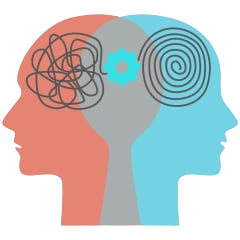COVID-19 Resources for Mental Health Coaches... Learn More
Cognitive Behavioral Therapy /REBT
- Cognitive Behavioral Therapy (CBT):
- Focus: CBT is a goal-oriented, short-term therapeutic approach that aims to identify and modify patterns of thinking and behaviour that contribute to emotional distress or dysfunctional behaviour.
- Key Concepts:
- Cognitive Restructuring: Examines and challenges irrational or negative thought patterns, replacing them with more realistic and constructive beliefs.
- Behavioural Activation: Targets behaviours associated with emotional difficulties, encouraging positive changes in daily activities to improve mood and well-being.
- Homework Assignments: Clients often engage in structured activities between sessions to reinforce and apply what they learn during therapy.
- Rational Emotive Behavior Therapy (REBT):
- Focus: REBT, developed by Albert Ellis, is a type of CBT that specifically addresses irrational beliefs as the root cause of emotional distress. It emphasizes changing irrational beliefs to promote emotional well-being.
- ABC Model:
- Activating Event (A): External events or situations that trigger emotional responses.
- Beliefs (B): Individuals interpret and evaluate the activating event based on their beliefs. Ellis identified irrational beliefs as a primary source of emotional disturbance.
- Consequences (C): Emotional and behavioural outcomes resulting from the interaction between activating events and beliefs.
- Disputing Irrational Beliefs: Involves challenging and disputing irrational beliefs to replace them with more rational and constructive thoughts.
Both CBT and REBT are evidence-based therapies widely used to treat various mental health issues, including anxiety, depression, phobias, and stress. They share the common principle that changing distorted thoughts and maladaptive behaviors can lead to positive changes in emotions and overall well-being.


